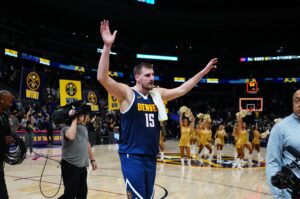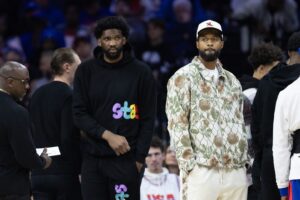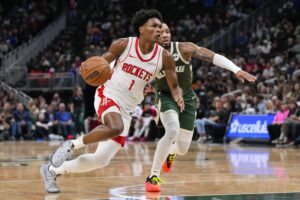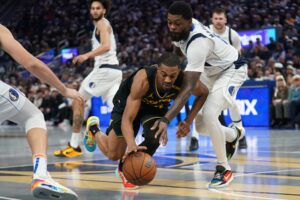Titles or Tanking: Mediocre Orlando Magic in NBA’s Wasteland
Champions in Today’s NBA
The Orlando Magic are nowhere near an NBA title. In order to compete for an NBA championship in today’s world of free agency, one thing is clear — the draft matters. Whether you’re drafting Stephen Curry, Klay Thompson, and Draymond Green, which the Golden State Warriors did, or turning picks and prospects into Kevin Love, as the Cleveland Cavaliers did, it takes the draft to build a title contender. Some may be quick to point out the franchise-changing free agent signings of Kevin Durant and LeBron James (and I will not downplay the impact of those signings), but it was both well-scouted drafting and a bit of luck that made these two teams each make three straight NBA Finals appearances. These squads are built for titles, and they tanked to get there.
From 2008 to 2012, the Warriors were a combined 114-198 and amassed five first-round draft picks, four of which were in the top 11. Similarly, the Cavs from 2010 to 2014 (the James-less years) went 97-215 and amassed seven first-rounders, five in the top 11. These four-year stretches both happened after a star left the respective teams (Baron Davis and LeBron James) and can be seen as the direct path to their current dominance.
Meanwhile in Orlando
The Orlando Magic had a similar franchise-imploding superstar leave and, despite winning the great Dwight Howard trade of 2012, have not sniffed the playoffs since then. What’s worse is that they are caught in the no man’s land of neither competing for titles nor tanking. In the five drafts after Howard’s last season with the Magic, Orlando has had six first-round picks. All but one were in the top 11. Orlando turned two of those top 11 picks, Domantas Sabonis and Victor Oladipo, into Serge Ibaka in a trade that turned into a half-season rental.
The Magic have not won the lottery once in the span since Howard left. None of their draftees have made an All-Star team. None of these players have averaged 17 points per game or more. The inability to use young assets and plenty of picks, as well as a lack of luck and commitment have cost the Magic precious years in their rebuild.
Rob Hennigan’s Final Off-Season
Former GM Rob Hennigan‘s last off-season on the job was one of the biggest blunders of the modern free agency era. In a new NBA where analytics and three-pointers reign, Hennigan went the contrarian route. He signed center Bismack Biyombo to a long-term deal and traded for another shot-blocking big man in Ibaka. These two, along with Nikola Vucevic, created both a logjam for playing time and an outdated, unattractive roster devoid of cap space for impactful free agents.
A deeper look at the signing of Biyombo becomes even more egregious. Biyombo’s four-year, $72 million contract, combined with the other bigs on the team, adds up to 43 percent of the team’s salary cap, hamstringing the Magic’s future flexibility. Orlando would’ve been better off signing Marvin Williams that summer instead of Biyombo. Williams, who signed a much more team-friendly contract (four-years, $54 million), is much more suitable for today’s NBA. He’s a true three-and-D player; he shoots 85 percent from the free throw line and 35 percent from beyond the arc, and he can guard multiple positions.
Orlando’s temporary rental of Ibaka further set the franchise back. The Magic’s acquisition of the big man led to archaic lineups that were outmatched in today’s NBA and stunted the development of Aaron Gordon. Seeing what this misuse of prospects was doing to the team, the Magic smartly traded Ibaka for Terrence Ross and a first-round pick. The team played much better down the stretch, but fans were heartbroken when they saw that the same players who were traded to Oklahoma City were flipped to Indiana the following year for bonafide superstar Paul George. These signings and trades were killers to Orlando’s rebuild, as they put the Magic neither in title contention nor in a position to acquire a top-three pick.
Unlike Orlando, Philadelphia Rebuilt the Right Way
Compare the Magic to the Philadelphia 76ers during the same time period and the results are even more apparent. Though the 76ers only had one more draft pick, all but one of those picks were within the Klay Thompson realm of the 11th overall pick. Two have been the first overall selection, and two more have been the number three pick. Their commitment to tanking has led to much better prospects and far more cap flexibility. Former GM Sam Hinkie, mastermind of “The Process,” and the Sixers would only sign players on minimum contracts, and they filled out their roster with many second-rounders. When those second-rounders developed, they were on team-friendly contracts and were often flipped for more picks, which are vital to a rebuild.
After a five-year stretch in which Orlando won only 23 more games than the 76ers, it is clear whose plan has led to a better present and future for the respective franchises. The Magic must identify their plan, whatever that plan may entail, and stick with it. For too long, the Orlando Magic have been stuck in mediocrity. It’s either titles or tanking; in today’s NBA, there’s no room for in between.
Main Photo:
Embed from Getty Images






